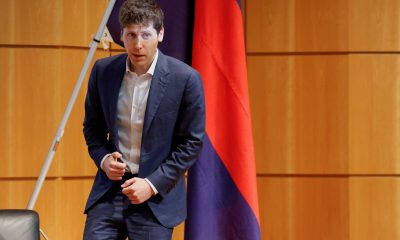Economy
Factbox-Governments race to regulate AI tools

Rapid advances in artificial intelligence (AI) such as Microsoft-backed OpenAI’s ChatGPT are complicating governments’ efforts to agree laws governing the use of the technology.
Here are the latest steps national and international governing bodies are taking to regulate AI tools:
AUSTRALIA
The government is consulting Australia’s main science advisory body and considering next steps, a spokesperson for the industry and science minister said in April.
BRITAIN
The Financial Conduct Authority, one of several state regulators that has been tasked with drawing up new guidelines covering AI, is consulting with the Alan Turing Institute and other legal and academic institutions to improve its understanding of the technology, a spokesperson told Reuters.
Britain’s competition regulator said in May it would start examining the impact of AI on consumers, businesses and the economy and whether new controls were needed.
Britain said in March it planned to split responsibility for governing AI between its regulators for human rights, health and safety, and competition, rather than creating a new body.
CHINA
The Chinese government will seek to initiate AI regulations in its country, billionaire Elon Musk said on June 5 after meeting with officials during his recent trip to China.
China’s cyberspace regulator in April unveiled draft measures to manage generative AI services, saying it wanted firms to submit security assessments to authorities before they launch offerings to the public.
Beijing will support leading enterprises in building AI models that can challenge ChatGPT, its economy and information technology bureau said in February.
EUROPEAN UNION
The U.S. and EU should push the AI industry to adopt a voluntary code of conduct within months to provide safeguards while new laws are developed, EU tech chief Margrethe Vestager said on May 31. Vestager said she believed a draft could be drawn up “within the next weeks”.
Key EU lawmakers in May agreed on tougher draft rules to rein in generative AI and proposed a ban on facial surveillance. The European Parliament will vote on the draft of the EU’s AI Act in June.
The European Consumer Organisation (BEUC) has joined in the concern about ChatGPT and other AI chatbots, calling on EU consumer protection agencies to investigate the technology and the potential harm to individuals.
FRANCE
France’s privacy watchdog CNIL said in April it was investigating several complaints about ChatGPT after the chatbox was temporarily banned in Italy over a suspected breach of privacy rules.
France’s National Assembly approved in March the use of AI video surveillance during the 2024 Paris Olympics, overlooking warnings from civil rights groups.
G7
Group of Seven leaders meeting in Hiroshima, Japan, acknowledged on May 20 the need for governance of AI and immersive technologies and agreed to have ministers discuss the technology as the “Hiroshima AI process” and report results by the end of 2023.
G7 nations should adopt “risk-based” regulation on AI, G7 digital ministers said after a meeting in April in Japan.
IRELAND
Generative AI needs to be regulated, but governing bodies must work out how to do so properly before rushing into prohibitions that “really aren’t going to stand up”, Ireland’s data protection chief said in April.
ISRAEL
Israel has been working on AI regulations “for the last 18 months or so” to achieve the right balance between innovation and the preservation of human rights and civic safeguards, Ziv Katzir, director of national AI planning at the Israel Innovation Authority, said in June.
Israel published a 115-page draft AI policy in October and is collating public feedback ahead of a final decision.
ITALY
Italy’s data protection authority plans to review other artificial intelligence platforms and hire AI experts, a top official said in May.
ChatGPT became available again to users in Italy in April after being temporarily banned over concerns by the national data protection authority in March.
JAPAN
Japan’s privacy watchdog said on June 2 it has warned OpenAI not to collect sensitive data without people’s permission and to minimise the sensitive data it collects, adding it may take further action if it has more concerns.
SPAIN
Spain’s data protection agency said in April it was launching a preliminary investigation into potential data breaches by ChatGPT. It has also asked the EU’s privacy watchdog to evaluate privacy concerns surrounding ChatGPT.
UNITED NATIONS
U.N. Secretary-General Antonio Guterres on June 12 backed a proposal by some AI executives for the creation of an AI watchdog like the International Atomic Energy Agency, but noted that “only member states can create it, not the Secretariat of the United Nations”.
Guterres has also announced plans to start work by the end of the year on a high-level AI advisory body to regularly review AI governance arrangements and offer recommendations.
U.S.
The U.S. Federal Trade Commission’s chief said in May the agency was committed to using existing laws to keep in check some of the dangers of AI, such as enhancing the power of dominant firms and “turbocharging” fraud.
Senator Michael Bennet introduced a bill in April that would create a task force to look at U.S. policies on AI, and identify how best to reduce threats to privacy, civil liberties and due process.
The Biden administration earlier in April said it was seeking public comments on potential accountability measures for AI systems.
Economy
Russian central bank says it needs months to make sure CPI falling before rate cuts -RBC


© Reuters. Russian Central Bank Governor Elvira Nabiullina attends a news conference in Moscow, Russia June 14, 2019. REUTERS/Shamil Zhumatov/File Photo
MOSCOW (Reuters) – Russia’s central bank will need two to three months to make sure that inflation is steadily declining before taking any decision on interest rate cuts, the bank’s governor Elvira Nabiullina told RBC media on Sunday.
The central bank raised its key interest rate by 100 basis points to 16% earlier in December, hiking for the fifth consecutive meeting in response to stubborn inflation, and suggested that its tightening cycle was nearly over.
Nabiullina said it was not yet clear when exactly the regulator would start cutting rates, however.
“We really need to make sure that inflation is steadily decreasing, that these are not one-off factors that can affect the rate of price growth in a particular month,” she said.
Nabiullina said the bank was taking into account a wide range of indicators but primarily those that “characterize the stability of inflation”.
“This will take two or three months or more – it depends on how much the wide range of indicators that characterize sustainable inflation declines,” she said.
The bank will next convene to set its benchmark rate on Feb. 16.
The governor also said the bank should have started monetary policy tightening earlier than in July, when it embarked on the rate-hiking cycle.
Economy
China identifies second set of projects in $140 billion spending plan


© Reuters. FILE PHOTO: Workers walk past an under-construction area with completed office towers in the background, in Shenzhen’s Qianhai new district, Guangdong province, China August 25, 2023. REUTERS/David Kirton/File Photo
SHANGHAI (Reuters) – China’s top planning body said on Saturday it had identified a second batch of public investment projects, including flood control and disaster relief programmes, under a bond issuance and investment plan announced in October to boost the economy.
With the latest tranche, China has now earmarked more than 800 billion yuan of its 1 trillion yuan ($140 billion) in additional government bond issuance in the fourth quarter, as it focuses on fiscal steps to shore up the flagging economy.
The National Development and Reform Commission (NDRC) said in a statement on Saturday it had identified 9,600 projects with planned investment of more than 560 billion yuan.
China’s economy, the world’s second largest, is struggling to regain its footing post-COVID-19 as policymakers grapple with tepid consumer demand, weak exports, falling foreign investment and a deepening real estate crisis.
The 1 trillion yuan in additional bond issuance will widen China’s 2023 budget deficit ratio to around 3.8 percent from 3 percent, the state-run Xinhua news agency has said.
“Construction of the projects will improve China’s flood control system, emergency response mechanism and disaster relief capabilities, and better protect people’s lives and property, so it is very significant,” the NDRC said.
The agency said it will coordinate with other government bodies to make sure that funds are allocated speedily for investment and that high standards of quality are maintained in project construction.
($1 = 7.1315 renminbi)
Economy
Russian central bank says it needs months to make sure CPI falling before rate cuts -RBC


© Reuters. Russian Central Bank Governor Elvira Nabiullina attends a news conference in Moscow, Russia June 14, 2019. REUTERS/Shamil Zhumatov/File Photo
MOSCOW (Reuters) – Russia’s central bank will need two to three months to make sure that inflation is steadily declining before taking any decision on interest rate cuts, the bank’s governor Elvira Nabiullina told RBC media on Sunday.
The central bank raised its key interest rate by 100 basis points to 16% earlier in December, hiking for the fifth consecutive meeting in response to stubborn inflation, and suggested that its tightening cycle was nearly over.
Nabiullina said it was not yet clear when exactly the regulator would start cutting rates, however.
“We really need to make sure that inflation is steadily decreasing, that these are not one-off factors that can affect the rate of price growth in a particular month,” she said.
Nabiullina said the bank was taking into account a wide range of indicators but primarily those that “characterize the stability of inflation”.
“This will take two or three months or more – it depends on how much the wide range of indicators that characterize sustainable inflation declines,” she said.
The bank will next convene to set its benchmark rate on Feb. 16.
The governor also said the bank should have started monetary policy tightening earlier than in July, when it embarked on the rate-hiking cycle.

 Forex4 years ago
Forex4 years agoForex Today: the dollar is gaining strength amid gloomy sentiment at the start of the Fed’s week

 Forex3 years ago
Forex3 years agoUnbiased review of Pocket Option broker

 Forex3 years ago
Forex3 years agoDollar to pound sterling exchange rate today: Pound plummeted to its lowest since 1985

 Forex3 years ago
Forex3 years agoHow is the Australian dollar doing today?

 Cryptocurrency3 years ago
Cryptocurrency3 years agoWhat happened in the crypto market – current events today

 World3 years ago
World3 years agoWhy are modern video games an art form?

 Commodities3 years ago
Commodities3 years agoCopper continues to fall in price on expectations of lower demand in China

 Economy3 years ago
Economy3 years agoCrude oil tankers double in price due to EU anti-Russian sanctions





























